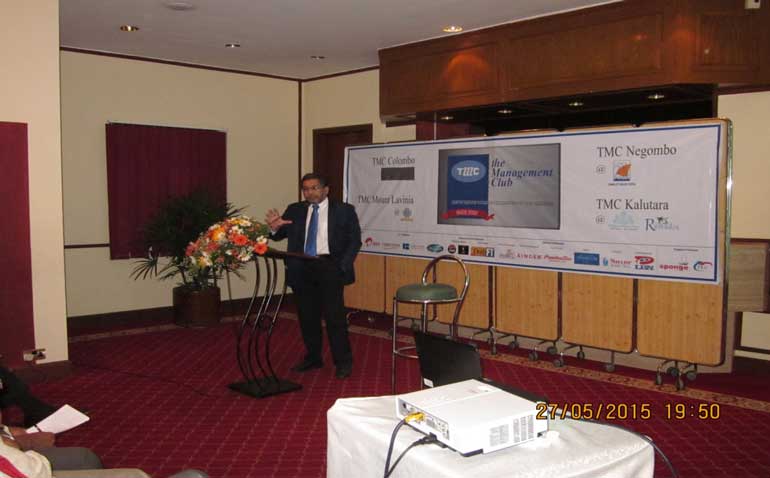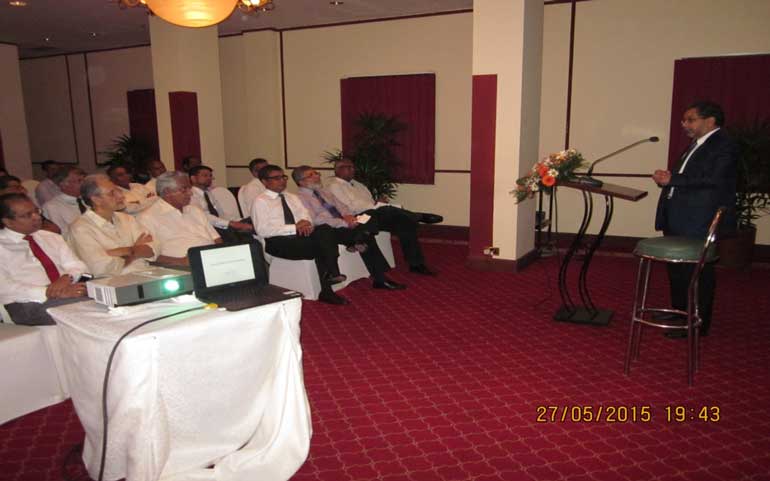Friday Feb 20, 2026
Friday Feb 20, 2026
Monday, 22 June 2015 00:00 - - {{hitsCtrl.values.hits}}


Dr. Saman Kelegama DPhil (Oxon) was the distinguished guest speaker at The Management
Club’s (TMC) fourth ‘members meet’ held at the VIP Room of the Galadari Hotel recently. He was no stranger to TMC members as he had been the keynote speaker at an evening presentation at TMC Negombo, sometime ago.
Emeritus President Fayaz Saleem made the welcome address and introduced the speaker.
The topic was ‘Current State of the Economy’ and the membership was very excited to hear the thoughts of a reputed economist and the Director of the well respected think tank – Institute of Policy Studies of Sri Lanka. The topic was not only controversial but was full of many shades of grey – with doubts cast on the statistics provided by various past and present economic experts and National Policy Planners. A rapt audience of over 50 participants were gathered at 7:30 p.m. that evening.
Dr. Kelegama’s presentation was very conservative and he took us back to 2010, to a time soon after the end of the internal hostilities, when Sri Lanka and the region looked forward to rapid expansion of the Sri Lankan economy at the end of 30 years of conflict that had crippled the economy.
The main focus of the then Government was on debt financed infrastructure development. By the end of 2014, foreign debt financing was at the high level of 60% of GDP and over 50% of loans were non concessional. A worrying trend was that the debt financed investments did not give returns to service the debt.
From 2013 the debt roll-over borrowings were reaching high levels with the Public Debt at 80% of GDP. In 2014 the Government was turning to the commercial banks such as the Bank of Ceylon and the National Savings Bank for raising funds from the global capital market, among other factors to service debts. Clearly the strategy was not sustainable beyond a point unless there were adequate returns from the debt-financed projects.
The economy was not in a healthy state when the new Government took over in early January 2015. By January 2015 government contractors had not been paid for one, two and even three years. To add insult to injury, the new government had made election pledges that they would come up with relief packages that they could hardly afford. They needed funds to facilitate not only the relief packages but also to cover up the foregone revenue by offering the generous tax concessions in the mini budget.
There are many risks that the Sri Lanka economy would have to face in the near future – two of them would be the possible increase in oil prices and the rapid depreciation of the Euro where bulk of the Sri Lankan exports compete The tourism sector had not realised the expected numbers of high spending tourists visiting Sri Lanka. Inward remittances continued to be from the traditional sectors of foreign employment earnings. He spoke of some relief in this scenario with the possible regaining of GSP Plus and the lifting of the ban on fish from Sri Lanka to Europe.
He felt it was imperative that Sri Lanka has a stable political climate in order to fix the economy, and hence an early election was essential.
Questions were raised about the controversy surrounding the Colombo Port Commercial Development project as well as the implications of a negative report on Sri Lanka at September’s Geneva HR deliberations.
In response to questions from the audience, Dr. Kelegama expressed confidence that the Colombo Port Commercial Project will be resolved soon and the fact that China was an important economic partner for Sri Lanka it should not be totally abandoned.
He also expressed confidence on the outcome of the Geneva deliberations in September 2015, based on the recent visit to Sri Lanka of Prime Minister Modi of India and Secretary Kerry of USA.
TMC Board of Management President Nasser Majeed gave the vote of thanks, appreciating Dr. Kelegama’s willingness to address members in spite of his busy schedule, the continued support of the management of Galadari Hotel as well as the main sponsors of The Management Club and the members and their guests who attended the event.